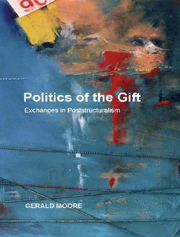Book contents
- Frontmatter
- Contents
- Acknowledgements
- Abbreviations
- Series Editor's Preface
- Introduction: Spectres of Mauss
- 1 Speech, Sacrifice and Shit: Three Orders of Giving in the Thought of Jacques Lacan
- 2 The Eternal Return of the Gift: Deleuze (and Derrida) contra Lacan
- 3 Repeating the Political: Heidegger and Nancy on Technics and the Event
- 4 ‘Pour en finir avec …’: Democracy and Sacrifice
- Conclusion: Variations on a Theme from Nietzsche
- Bibliography
- Index
4 - ‘Pour en finir avec …’: Democracy and Sacrifice
Published online by Cambridge University Press: 12 September 2012
- Frontmatter
- Contents
- Acknowledgements
- Abbreviations
- Series Editor's Preface
- Introduction: Spectres of Mauss
- 1 Speech, Sacrifice and Shit: Three Orders of Giving in the Thought of Jacques Lacan
- 2 The Eternal Return of the Gift: Deleuze (and Derrida) contra Lacan
- 3 Repeating the Political: Heidegger and Nancy on Technics and the Event
- 4 ‘Pour en finir avec …’: Democracy and Sacrifice
- Conclusion: Variations on a Theme from Nietzsche
- Bibliography
- Index
Summary
‘The “and” conjoins but never innocently or romantically. So much at stake’ (Ansell-Pearson 1997b: 1). At stake, precisely, is nothing less than the future of philosophy and politics, an allegedly impossible future no longer bound by the strictures of a period, no longer subject to the categories and binary oppositions of modernity. In the introductory essay on ‘Rhizome’ in A Thousand Plateaus, Deleuze and Guattari assert the need to ‘establish a logic of the and’ in order to ‘overthrow ontology, do away with foundations, nullify endings and beginnings’ (TP, 25/36–7). The deployment of the rhizomatic ‘and … and … and’ serves to desubstantialise the hegemonic, arboreal logic of the verb, emphasising the theft, the withdrawal of substance that coincides with the giving of the event. It thus also frees us to trace constellations between the supposedly incommensurable: to seek in democracy, for example, a lens on to the fate of sacrifice.
Expressed through the elegantly desubstantialising ‘“without” without privation or negativity or lack’ of Blanchot and Derrida (LO, 87/140), the so-called postmodern age of high capitalism might loosely be defined as a period without period, a time without time, whose nostalgia for the present coincides with its being beyond the End of History and the ‘metanarratives’ of modernity (Jameson 1991: 19–21; Lyotard 1986: xxiv/7). There is also therefore an ambiguity of the end, an interminable repetition of the end (Nancy 1986: 15), inseparable from what Badiou has called ‘the end of the End of History [which] is cut from the same cloth as this End’ (Badiou 1999: 31/11; Badiou 2008b: 9–10/64).
- Type
- Chapter
- Information
- Politics of the GiftExchanges in Poststructuralism, pp. 152 - 192Publisher: Edinburgh University PressPrint publication year: 2011



